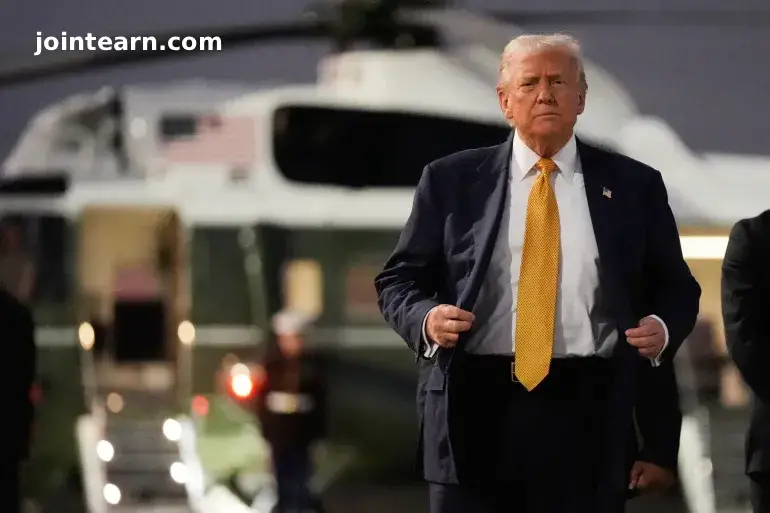
Tokyo, Japan – October 28, 2025 — United States President Donald Trump has dismissed speculation that he might run as vice president in the 2028 election, even as he again hinted that he would “love” to serve a third term as president, despite the US Constitution’s two-term limit.
Speaking to reporters aboard Air Force One on his flight from Malaysia to Japan, Trump addressed ongoing chatter among his supporters about potential loopholes that might allow him to remain in power beyond 2029. His remarks come after attending the ASEAN Summit in Kuala Lumpur and before heading to Tokyo and Seoul for bilateral and regional meetings.
Trump Rejects “Too Cute” VP Strategy, But Doesn’t Rule Out Third Term
Asked directly about the possibility of running for vice president in 2028, Trump dismissed the idea as “too cute,” suggesting voters would reject such a maneuver.
“I wouldn’t do that,” he told reporters. “I think it’s too cute. The people wouldn’t like that. It wouldn’t be right.”
While Trump acknowledged that some of his allies have explored the idea of him appearing on the ticket as vice president — potentially stepping into the presidency should the elected president resign — he clarified he had no interest in such a strategy.
The former reality TV star–turned-politician, however, left the door open to other possibilities. “I would love to do it,” Trump said of serving another term. “I have my best numbers ever.” When pressed on whether he was ruling out a third term, Trump responded playfully: “Am I not ruling it out? I mean, you’ll have to tell me.”
Legal and Constitutional Barriers
Trump’s remarks have reignited debate among constitutional scholars, who argue that the US Constitution explicitly bars anyone from serving more than two terms as president. Ratified in 1951, the 22nd Amendment clearly states that “no person shall be elected to the office of the President more than twice.”
Legal experts also note that the 12th Amendment makes Trump ineligible for the vice presidency, as it stipulates that no one “constitutionally ineligible to the office of President shall be eligible to that of Vice President.”
Despite this, Trump’s continued teasing of a third term has energized his loyal base, with supporters frequently donning “Trump 2028” hats at rallies and White House events. Photos from a recent Diwali celebration showed an attendee wearing one such hat in the Oval Office, symbolizing his followers’ appetite for extending his political legacy.
Political Context and 2028 Prospects
At 79, Trump remains one of the most polarizing yet dominant figures in American politics. His ongoing influence over the Republican Party has shaped the early field for the 2028 presidential race. When asked about potential successors, Trump praised Vice President JD Vance and Secretary of State Marco Rubio, calling them “great people” and saying, “If they ever formed a group, it’d be unstoppable.”
Trump’s approval ratings, bolstered by what he describes as record economic performance and foreign policy “wins,” have given him confidence to continue hinting at ambitions beyond the traditional two-term framework.
Political analysts suggest that Trump’s remarks — though unlikely to translate into action — are part of a familiar pattern of provocative rhetoric aimed at energizing his base and dominating news cycles. “It’s classic Trump,” said political analyst Dr. Rachel Goodman. “He knows the Constitution bars it, but by floating the idea, he keeps himself at the center of attention and frames the narrative around loyalty and power.”
From ASEAN to Asia-Pacific Diplomacy
Trump’s comments came during a stopover in Tokyo after a high-profile appearance at the ASEAN Summit in Kuala Lumpur, where he signed several bilateral trade deals with Southeast Asian nations, including Cambodia and Malaysia. Following his Tokyo meetings — including talks with Japanese Prime Minister Sanae Takaichi — Trump is scheduled to travel to South Korea for the Asia-Pacific Economic Cooperation (APEC) forum.
While in Seoul, he is expected to meet Chinese President Xi Jinping to discuss trade, tariffs, and global economic stability — part of his ongoing effort to ease tensions amid a turbulent US–China relationship.
Analysts Weigh In on Trump’s Political Messaging
Political observers note that Trump’s remarks about 2028 serve multiple purposes: reinforcing his dominance within the Republican Party, deflecting criticism over constitutional norms, and keeping media attention on his persona rather than policy.
“Trump is positioning himself as the indispensable leader — someone who’s above the normal limits of political power,” said Dr. Jonathan Albright of Georgetown University. “Even if he can’t legally run again, the symbolism of a ‘Trump 2028’ movement keeps his influence alive.”
Meanwhile, within Washington, some lawmakers have expressed concern over the normalization of rhetoric challenging constitutional safeguards. “No one — not even a sitting president — is above the Constitution,” Senator Lisa Murkowski stated on X (formerly Twitter). “Two terms means two terms.”


Leave a Reply